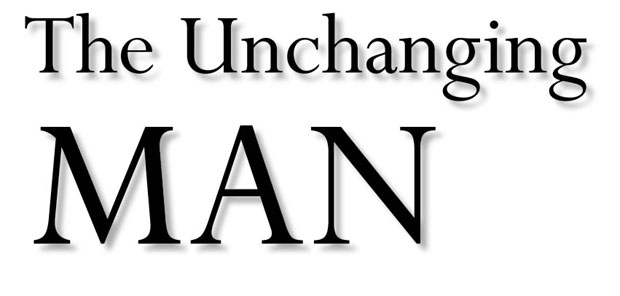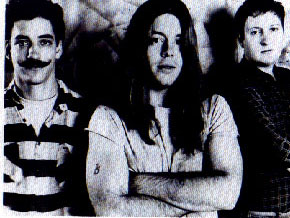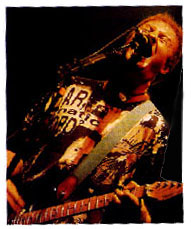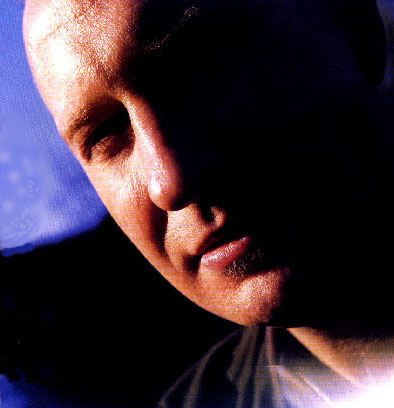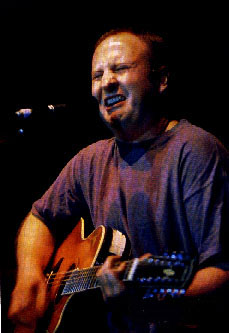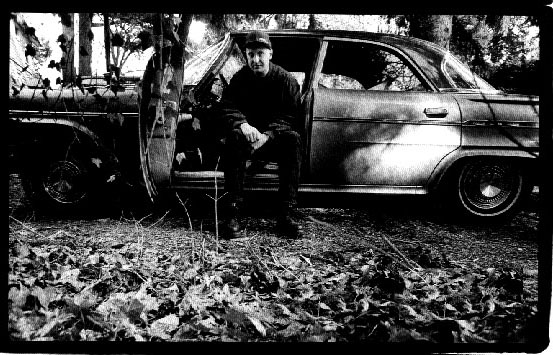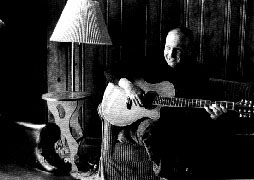| Mojo (UK) September 1998 |
|
|
|
|
|
Name:
Bob MouldTitle: The Godfather of Grunge
CV: Husker Du, Sugar, and solo.
Job: Setting clinical depression to a rock 'n' roll beat
Dilemma: "When Bob bleeds, its fun for everyone else. But what about me?"
Dave Cavanagh
reports.
P
OLITICIANS AND MOVIE-MAKERS CALL IT Adog and pony show: going out there and selling what you've got.
Bob Mould, a fond and frequent user of metaphor, found in that one
something fatalistic and pejorative that tickled him. With a slap of finality,
he has called his new album The Last Dog And Pony Show. "That's it
now," he will say, looking to amuse. "I want to go and make rap
records." It has taken Mould almost 38 years of his life - and 18 years
of recording - to reach the point where many of his habits, instincts
and working methods strike him as being no longer appropriate or
even tolerable. In his early twenties he was the big guy in
Husker Du, a figure described by the NME as "half man, half lager",
screaming verses of pain and anger over a power trio attack that sounded
like a frantic Byrds exploding in a room full of bottles. Then there was
the slimmed-down Mould of 1989 whose first solo album Workbook, was one of
the year's most pleasant surprises. Here was a calmer, more studied,
sometimes even gentle musician, even if his words still spoke of a daily
hell. More recently, there was the 32-year-old Mould who came to Europe
with Sugar: a man trying to re-establish his position in a post-Nevermind
climate by composing the blood-curdling work, Beaster, in which he was
crucified like Christ - the album entered the UK album charts at Number 3.
His career has outlasted three major American genres: hardcore punk,
alternative rock and grunge. As each one fell from grace, he remained
exempt from the backlash. He had achieved seniority by the relatively
young age of 26, his influence on modern rock acknowledged ever since.
Even in a personality-led industry like the rock business, Mould, a
clinical depressive, a former alcoholic and a homosexual, remains - in the
best sense - a non-story. He approaches his forties as one of the most
critically acclaimed and respected artists of the 1980s and '90s.
Until this summer, he had not visited Britain in four years. In 1994 the
three members of Sugar met in Atlanta to commence work on their third album
- just as the success of Parklife was threatening to have serious
ramifications in the UK for Mould's brand of intense American rock. As it
happened, Sugar fluffed the recording process, made the album again and,
amid weariness and disappointment, disbanded the following year. Hardly
anyone noticed.
After that came what Mould calls an "episode"; a long depression that
lasted until the summer of 1996. An album emerged that year - titled
simply Bob Mould - that hinted strongly that he had been close to suicide.
It was barely promoted, contained no singles and was sung and played
entirely by Mould himself. "Not the most uplifting of records," he now
admits. "I still don't have a good explanation for it."
The depression prompted one realisation, at least; life could not go on
like that.
|
|
A
FLOCK OF SEAGULLS, THE STYLISTICS, GLENN MEDEIROSand the Pixies all have something in common: they have all mixed at least
one of their albums at Carriage House Studios, Stamford, Connecticut.
The setting is secluded - a small suburban building patrolled by an
angry dog - without being isolated. Mould is sharing the premises
with a group of theatre people who are putting on a children's show in
the town; this involves them playing Do Re Mi from The Sound Of Music
on a synthesizer for hours at a stretch. Now would be the time for Bob Mould
to launch into one of his famous screams.
But Mould in person is a quiet, somewhat unassertive character who
resembles a cross between Baloo the Bear and a sprts coach who has the
unexpected ability to sit absolutely still.
"As I get older," he sighs, "I'm realising the maybe I didn't allow myself
to have as much fun as I should. It sucks, but I've still got a lot of
time to fix it."
It is March 1998 and Mould is better now. It dawned on him earlier this
year that he could pinpoint exactly when "it all started to go wrong" -
that is, when the painful journey to the Bob Mould album began. A Village
Voice poll in 1985 listed the 10 best albums of the previous 12 months.
Husker Du, always a prolific band, were placed twice.
"That was the day it all stopped being fun for me," he says gravely. "All
of a sudden - and I don't know why it's taken me 13 years to realise it -
but I felt like I had this obligation to make great records instead of the
records I liked."
Mould makes such a high-minded ambition sound like a life sentence: the
more internal, the more distressed he got, the more popular he became.
"When Bob Mould bleeds, it's more fun for everyone else," he says. "But
what does it do to me? When I have to do the same old witch trials every
night?" Hence the outlandish Beaster, with Bob nailed to the cross so that
the grunge kids of the world might mosh more enjoyably
But all this martyr stuff is playing itself out. There are songs on The
Last Dog And Pony Show that hint at optimism - and Mould himself talks of
finding a new balance in his world. For example, he considers 1996 a good
year because he wrote only three songs. That autumn, moreover, he
experienced a revelation in Minneapolis, the city in which Husker Du were
formed. On a night off from touring, he attended two concerts at nearby
venues: Richard Thompson and Neil Young & Crazy Horse.
"I was going back and forth between the two shows, and one of them was
really classy and the other really tired. I love Neil Young, I love seeing
him play acoustic, but [he and Crazy Horse] are up there jamming that same
E chord. It was like, Are you going to buy that amp, Neil, or are you just
trying it out? Richard was doing the thing with Danny [Thompson] and it
was just a lot more tasteful. Richard and Neil Young are two people I
really have a lot of respect for, and I sort of looked at it, like, I don't
want to be 43, 46 years old, up there playing Sugar songs with a big old
stack of amps behind me."
Mould has been playing solo acoustic shows since 1989, in between, and as a
respite from, the raucous electric visits of Sugar and his Bob Mould Band
of the early '90s. He has now decided that this is the best way to go.
Therefore, when his new band has finished touring The Last Dog And Pony
Show in November 1998, Mould will become a full-time unplugged artist,
venturing out as and when he has a window in his personal life.
"I don't want to be on the road when my dog dies," he says surprisingly.
"He's 11. I don't want to make the call home and hear, 'Oh, Domino died.'
It's not like I'm quitting touring because of my dog. But that's one of
many things. When I was away for five weeks in Austin [recording] this
album, the first night I came home I wanted to have some ice-cream before I
went to bed, and I couldn't remember where the bowls were. And that shit
bothers me. What else have I missed?"
The first wave of Husker Du fans are now in their mid to late thirties and
Mould presumes they no longer want to stand in a hall listening to a
deafening racket, any more than he wants to stand on stage creating it.
Whereas the Mould of the Sugar era worried about how to find newer and more
extreme guitar sounds to match those of Sonic Youth, the Pixies and his own
Husker Du, the Bob of today frets about exactitudes of tone and tempo, and
about how The Last Dog And Pony Show will sound through headphones.
Well, actually, it will sound like a compendium of the various Bob Mould
albums since Workbook. "Is this a good album? Sure. Is it my best album?
Nah." The songs are covered in acoustic and electric guitars, with
metronomic snare-drum fills and the sort of agonised vocals that would
sound startling if Mould were a newcomer. But it's his 15th album and
these are places he's taken us to before.
"Sometimes I get so sick of what I do," he scowls. "Two weeks into this
record I was like, I hate this record. Here it is, another high quality,
somewhat introspective, somewhat poppy Bob Mould record - exactly what
people have been expecting since fucking 1985. Why don't I have the nerve
to do something else?
As it happens, the album contains one example of "something else". This is
a track called Megamanic - recorded with heavy use of sampling - the mere
mention of which causes Mould and engineer Wilson to exchange "oops"
grimaces and knowing laughter. Conceived during a break from all the
guitar songs, it's not like anything he has recorded before. A growling,
machine-driven rap with free-associating, Beck-esque lyrics, it features a
James Brown-style guitar lick and a prominent sampled sound very like the
keyboard-simulated ney that meandered through Baby You're A Rich Man.
(Just as Mould feared, however, he lost his nerve a little, rendering the
ney sound almost inaudible in the final mix.)
"It's been cool to get over my machine phobia," he says, basking in the
temporary acclaim for Megamanic. "I feel like I can embrace it a little
bit more. It took a long time for me, because I grew up in [the time of]
'Disco Sucks'."
|
|
A
CHILDHOOD BEATLES FAN; BOB MOULD PICKEDup his first music-related grudge at the age of nine when he opened
the Daily News in upstate New York to learn that the Fab Four had
split. To his outrage, the last paragraph claimed that a British R&B
group called Led Zeppelin was preparing to fill the gap. Mould has
never liked Zeppelin since.
At school, there were attempts to get him to play the tuba - he was a hefty
lad even then - but he subsequently tired of music altogether, instead
playing basketball and "trying to fit in". By the mid-'70s he found
himself mixing with Kiss and Aerosmith fans. "I grew up in the hell that
was the first Boston album," he reminisces frostily. "Then there was that
group of kids that listened to Foghat all the time. But worst was the guy
I used to buy pot from in high school. Every time I went to his house, I'd
walk in and he'd be sitting there, shaking the stuff through his mom's
spaghetti strainer, with fucking Man On The Silver Mountain from the first
Rainbow album. Dio and Blackmore: two hells in one."
The first Ramones album marked his card as a punk rock fan, and on Sunday
nights he would tune into the radio station in Montreal - it phased in and
out as he listened - and hear songs like Anarchy In The UK. Not yet 18, he
left New York state for college in St. Paul, Minnesota to study
mathematics, with a view towards engineering of some kind, possibly
nuclear. "I went to a [college] that was supposed to be a great liberal
arts school that Humphrey and Mondale taught at. It was the fall of '78
and there were all these people my age dressed up in suits with briefcases,
talking about his guy Reagan who was going to run for President and change
the world. I hated those kids."
"I run into people I went to college with that are really successful now,"
Mould grins. "There's a guy called Peter Berg who's on Chicago Hope, a big
TV star in America. I didn't know him then, but I've talked to him since
and he was like, 'I was terrified of you, man. You had a look in your eye
like you were going to kill somebody.'"
The Young Republicans drove him to the bosom of Grant Hart, a drummer who
worked in a record shop near the college. Bassist Greg Norton worked in
another record shop, and Husker Du were underway. There was a punk scene
in St. Paul/Minneapolis, but it was "sort of arty and suburban. When
Husker Du showed up, being their ugly, speed-freak-looking selves, we were
immediately the outcasts." They snorted up trucker sulphate, claiming to
be the fastest band in America. But there was sensitivity and, in Mould's
case, a reservoir of anger left over from childhood. Their inspiration for
the name Husker Du is a board game that tests the memory. The slogan of
the game is "in which the child can outwit the adult".
When they played London's Camden Palace in May 1985, one reviewer wrote
that Mould's guitar playing "shames every punk player who walked a stage".
Two of the band (songwriter/vocalists Mould and Hart) had proud paunches;
the other sported a handlebar moustache and did amazing leaps on-stage.
The band's 1984 double album Zen Arcade, on the indie label SST, remains a
high watermark in '80s rock: brutal, odd, ambitious and diverse, with 23
songs that ranged in length from less than one minute to almost 14.
That same year, Warner Bros declared an interest. They eventually signed
in 1986 after two further albums for SST, New Day Rising and Flip Your Wig.
"We thought more people would like our music if they could get it,"
reasons Mould. "At the time, the K-Marts and the Woolworths of the world
didn't carry SST records. We thought, We've got to get out of the punk
rock ghetto. We should go for it."
With their major label debut Candy Apple Grey in 1986, a division between
Mould and Hart began to show. They had made four albums in 18 months, one
a double. "I was tired," Mould admits. "I'd stopped drinking in '86,
which changed my outlook on everything. A lot of the people I thought were
my friends dropped away because I wasn't drinking any more." Hart, with
whom Mould is these days back on speaking terms, recalled in 1990: "A lot
of the times in Husker Du you'd end up in a silent van across America. We
often couldn't clear the air."
While Husker Du recorded their next album, R.E.M. were just missing the US
Top 20 with Life's Rich Pageant. Warners had high hopes for the Huskers -
Mould, ever the pragmatist, estimates the band's following at no larger
than 150,000 - but Mould and Hart put an immediate fly in the marketing
department's ointment by demanding another double album. It had to be a
double, because neither of them would back down on their quota of songs.
To the outside world, Husker Du were really clicking into place. In
actuality, the band was falling apart. In February 1987, one week prior to
a scheduled US tour, their 24-year-old manager, David Savoy Jr, committed
suicide by jumping from a bridge in Minneapolis.
"That just sent everybody to their corners," Mould groans. "Nobody knew
how to deal with that. If anything was a fucking sign When things get to
the point where people in your inner circle are killing themselves, it's
usually a good time to stop. I know that now. In '87 I wasn't so smart.
We postponed the tour for a while, but then we went and rode our little
wagon out there."
Mould lost interest in dealing with Hart, who was now taking heroin, and
was bored with Greg Norton, whom he suspected of being too interested in
the money. "I'm sure, in hindsight, that I became a real prick from
quitting drinking and feeling more focused," Mould concedes.
In February 1988, a year after Savoy's death, it was announced that Husker
Du had split. Mould demoed material for Warners, but pleaded to be allowed
a fresh start and was released from contract. He retreated to a farm he
had bought in December 1987, 70 miles outside New York, where he wrote
Workbook and lost a great deal of weight.
"For the first few months I got totally lost in my own little world of
music," he remembers. "I'd feed the chickens every day, and once or twice
a week I'd venture out in my pick-up truck to get some food or some tape.
A very simple life. Bit I lost a lot of social skills. I felt like the
fucking Unabomber."
There was not a lot of rock'n'roll around. If he listened to other
people's music, it was to classical - he found the sound of violins
soothing - or Depression-era Appalachian folk music. With new management
and a new record company (Virgin US), he re-emerged with terrific songs,
strong mid-tempo arrangements, a cello (Jane Scarpantoni) and a rhythm
section of bassist Tony Maimone (ex-Pere Ubu) and drummer Anton Fier
(ex-Feelies, Pere Ubu). Mould would learn much from their playing styles.
"With Huskers, we were learning how to make a more streamlined paper
aeroplane, and to make it fly further and faster. With Anton and Tony, it
was like learning to drive a battletank, a whole different game. The songs
were slower, more dynamic, and Anton was a machine. I'd try and make him
go faster, but he wasn't having any of it."
Everything about Workbook announced maturity. It was pointed out to him
that the album had a touch of the Richard Thompsons about it, which led him
to discover Shoot Out The Lights and become a fan. Crowds made him nervous
after a year alone on the farm, so he started out gingerly, doing club
dates with a band (Fier, Maimone and former dB Chris Stamey). However, by
the end of 1989, with Stamey gone, the band was double-billing with the
Pixies, and "it [had] screaming punk rock hell again". Mould was once
again to be seen rolling around the stage, the portrait of agony.
Black Sheets Of Rain, much of it about a relationship breaking up, was not
the ideal follow-up to Workbook. Recorded at the Power Station (Mould was
now living in New York), it was a return to power chording and sonic
density, but with a stodginess that smacked of overkill. Within six weeks
of its release, Virgin stopped promoting it and gigs began to sell poorly.
At the start of 1991, Mould split the band, sacked his management, and was
freed from his record deal. He spent the rest of the year sorting out his
affairs and hitting the road with one 12-string acoustic and one electric
guitar, doing solo shows in North America, Australia and Europe.
Everybody was wondering what was going on," he recalls. "I was just out
there saying, Hey, I don't have a label deal, I don't have much of
anything. But I've got these songs and I know you'll like them. I'll take
the paycheck and move on to the next town and just try to rebuild slowly."
On the road he wrote new material, including some of what would become
Copper Blue. Restless again, he took David Barbe (bass) from a band in
Georgia called Mercyland and the 39-year-old steamhammer known as Malcolm
Travis from a group called The Zulus, and he called the trio Sugar.
Sugar would see Mould coming back to collect - daytime airplay, chart hits,
all the things denied to Husker Du. In 1992 they recorded a 30-song
session that included two brilliant albums, Copper Blue and Beaster. In
the course of 12 months, the band went from playing to 75 people in
Richmond, Virginia, to entertaining tens of thousands at festivals in
Europe. When they went in to record Beaster's follow-up, there appeared to
be no problems whatsoever. But with Bob Mould, there are never no problems
whatsoever.
|
|
I
T'S JULY 1998 AND THE DOG AND PONY SHOW HAStaken Mould to Amsterdam, where he is doing interviews. (The
previous day in Germany he did 13. Sure enough, every journalist
asked him about Megamanic.) He remains as committed as he was
in March to the idea of quitting live electric music. We mull over his
options. Jazz? Stand-up comedy? Acoustic?
"Acoustic would be the most likely thing. But the more I've been thinking
about it, I'm trying to think what else can I do? I'm sort of stumped.
But that's, I think, the beauty of it. Something that's not just a big
rock noise. I love it but I want to let go of it. It's been my calling
card for so long. The only way I'm going to change is if I make myself
change."
|
|
|
|
|
|
Amusement (Hüsker Dü, B-side of single, 1981, and on the Everything Falls Apart And More CD) Early, atypical Hüsker Dü. Recorded live in 1980 during brief infatuation with PiL's Metal Box. "I'm not easily amused," is Mould's opening line. I'll Never Forget You (Hüsker Dü Zen Arcade 1984) The Hüskers in a shitstorm, riffing as darkly as Black Sabbath only 10 times faster. Mould, incandescent with rage, screams until his voice gives out, his guitar solo a sensational, unrepeatable blur. The Tooth Fairy And The Princess (Hüsker Dü Zen Arcade 1984) A harrowing symphony of backwards guitar and sinister whispers ("late at night...don't get up") building to a terrifying scream. A child's worst nightmare. New Day Rising (Hüsker Dü New Day Rising 1985) Mould and Hart sing the same three words (the song's title) again and again over pounding drums and harsh, glassy guitar - rising in pitch until they're simply bawling at each other. What a way to start an album. Games (Hüsker Dü Flip Your Wig 1985) Slower, but hardly mellow. Mould's icy classic from Hüsker Dü's sixth album, a torrent of guitars and unease about the band's spreading popularity: "I was important when I was cool..." Hardly Getting Over It (Hüsker Dü Candy Apple Grey 1986) Turmoil. A funeral-paced acoustic ballad in which almost everyone he mentions dies. The single most upsetting song in his canon. Turn It Around (Hüsker Dü Warehouse: Songs And Stories 1987) Chiming, charming tune from the final Hüskers album. Keyboards, great harmonies and a mood of purpose that stirs the blood - sweet guitar interlude, too. Up In The Air (Hüsker Dü Warehouse: Songs And Stories 1987) From hesitant beginnings explodes one of the most dazzling choruses of the late '80s, both band and writer in exhilarating form. Sunspots (Bob Mould Workbook 1989) To begin his first solo album, Mould picks a delightful, folk-influenced guitar instrumental. The post-punk generation's Angie (Bert Jansch, not the Stones). Wishing Well (Bob Mould Workbook 1989) Acoustic guitars and cello underpin a winding, elusive melody. On the two-and-a-half minute mark, Mould hits the volume and plays a satisfyingly vicious solo. |
Black Sheets Of Rain (Bob Mould Black Sheets Of Rain 1990) Seven-minute-plus treatise on the filth of the city. Bob thinks: let's be Richard Thompson. Bob actually does: On Your Feet Or On Your Knees. The Act We Act (Sugar Copper Blue 1992) Instantly, we're in the ballpark. A massive sound - at last he gets the drums just right - that blends the 'grrr' of grunge with Mould's pop hookery and flair for a keening melody. A Good Idea (Sugar Copper Blue 1992) The Pixies were inspired by Hüsker Dü - now Bob returns the compliment with a cheeky homage in which a boy drowns his girlfriend while Bob watches. He's funny like that. The Slim (Sugar Copper Blue 1992) Taking its title from a nickname for Aids, this solemn and dense track started everyone talking when Copper Blue came out. Still sounds utterly brokenhearted. Judas Cradle (Sugar Beaster 1993) All manner of hellish visions proliferate on this track from Mould's best album. JC Auto (Sugar Beaster 1993) Mould as Jesus Christ on the cross. Guitar strings bend and burn; drumming hands flail. Walking Away (Sugar Beaster 1993) Evoking both Kevin Shields and Surf's Up, a sweet, organ-led hymn to end a perfect album. Gift (Sugar File Under: Easy Listening 1994) This disappointingly perfunctory album kicked off well with this musical tribute to My Bloody Valentine: lots of string-bending, distortion and flavour of Kentish Town circa '91. I Hate Alternative Rock (Bob Mould Bob Mould 1996) Bob rails at his peers, his audience and himself. Subtext: the ghouls all come from their humble abodes to get a jolt from his electrodes. Megamanic (Bob Mould The Last Dog And Pony Show 1998) Bob as a rap star. A weird and humorous odd-song-out with unlikely lyrics ("If you're not in the Batcave don't use the Batphone") and a genuine sense of mischief. |
